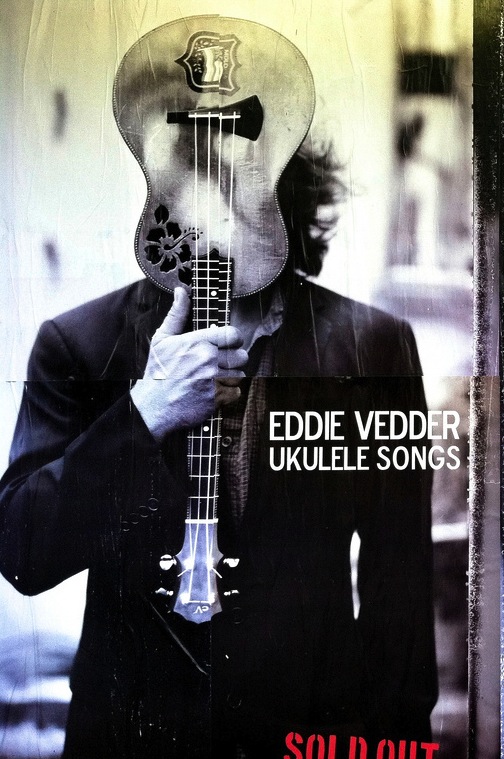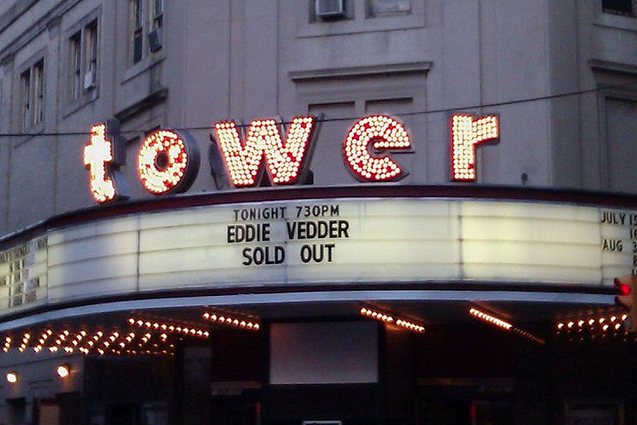
 BY COLONEL TOM SHEEHY Eddie Vedder was born Edward Louis Severson III on December 23, 1964, in Evanston, Illinois. Should this man ever decide to write his autobiography, he already has the title: “Longing To Belong” which is also the name of a song from his praiseworthy new album, “Ukulele Songs.” The need to have a relationship to people, places, and things seems to be an enduring theme running through much of Vedder’s music over the last two decades. As such, Vedder has made it his business to establish a very strong connection with Philadelphia which harkens back to the first time he performed here when his band Pearl Jam made their Philly debut at J.C. Dobbs back in 1991.
BY COLONEL TOM SHEEHY Eddie Vedder was born Edward Louis Severson III on December 23, 1964, in Evanston, Illinois. Should this man ever decide to write his autobiography, he already has the title: “Longing To Belong” which is also the name of a song from his praiseworthy new album, “Ukulele Songs.” The need to have a relationship to people, places, and things seems to be an enduring theme running through much of Vedder’s music over the last two decades. As such, Vedder has made it his business to establish a very strong connection with Philadelphia which harkens back to the first time he performed here when his band Pearl Jam made their Philly debut at J.C. Dobbs back in 1991.
Since that time, whenever Pearl Jam return to this area, Vedder often asks the audience “who was at that Dobbs show?” I was the promoter for that historic show, and before Pearl Jam took the stage that night, I had the opportunity to sit at the bar and have a conversation with Vedder over a few drinks. Besides enjoying the requisite dialogue regarding the then exploding Seattle music scene and a mutual love of basketball, I began to get the sense that this guy was somewhat more anxious about that evening’s show than most musicians I had spoken with over the years who were in pre-gig mode. Of course there was good reason for him to have a sense of solicitude. Here he was, at a club he never played before, yet two of his band mates already had a relationship with the room, as both Jeff Ament and Stone Gossard performed at Dobbs when they were in the band Mother Love Bone. Vedder also had the extra added burden of going on stage to perform material from the band’s first album “Ten” before it had even been released.
Through it all, Eddie Vedder rocked the house that night while fronting Pearl Jam and throughout that evening I found him so easy to bond with because it was quite apparent that this then-26 year old guy was searching for some kind of human reciprocity. Vedder’s ongoing need for connection probably emanates from his troubled childhood and since that time has manifested itself in the inspired art which he has created over the last 20 years with both Pearl Jam and through his solo work.
This yearning for connectivity was certainly in evidence last Saturday evening as a sold out audience at the Tower Theater  witnessed a truly wondrous performance and a rewarding lesson in the cathartic power of music. As a solo artist, some may lump Vedder in with the singer-song writer genre which dates back to the 1970s. That reference insufficiently portrays what it is this man does on stage. Vedder comes from a more traditional genus. He is more akin to the folk singer heritage that was prevalent during the 1950s and 1960s. That custom incorporated conversation with the audience that was part musical presentation, part colloquy.
witnessed a truly wondrous performance and a rewarding lesson in the cathartic power of music. As a solo artist, some may lump Vedder in with the singer-song writer genre which dates back to the 1970s. That reference insufficiently portrays what it is this man does on stage. Vedder comes from a more traditional genus. He is more akin to the folk singer heritage that was prevalent during the 1950s and 1960s. That custom incorporated conversation with the audience that was part musical presentation, part colloquy.
So, when this troubadour from the Northwest country hit the stage in Upper Darby over the weekend the exchange began with “Waving Palms” followed by a fierce rendition of “Can’t Keep” which is not only the opening track of “Ukulele Songs,” but is also the lead song from Pearl Jam’s 2002 album “Riot Act.” It was Vedder covering Vedder. Stripped down to just ukulele and vocal, “Can’t Wait” took on a certain sense of urgency and immediateness. The song’s strength came from its simplicity and simplicity was the modus operandi of the night. Instead of being surrounded by band mates, Vedder was encircled by ukuleles, mandolins, guitars, a pump organ, and a large reel to reel tape recorder. However, the most enthralling musical instrument was Vedder’s voice: a vigorous baritone in peak form.
The conversation began as Professor Vedder gave his audience a history lesson regarding the Tower Theater. He told them the place was built in 1927, and then asked that the lights be brought up so that everyone could see the beauty of that venue. He then said he felt like Justin Bieber, because of all the cameras that were aimed at him. He offered his followers a deal: he’d quickly make all the different faces he can, “that way you guys can all shoot your photos right now and get it over with.” At that point, a disorienting barrage of strobing flip phone flashes illuminated the darkened theater. The faithful subsequently kept their end of the bargain. Pearl Jam fans are such a tried-and-true bunch; they could teach loyalty to dogs.
Vedder carried on with more selections from “Ukulele Songs.” From the resolve of “Sleeping By Myself, ” to the sense of loss in “Without You” to the melancholy and bittersweet of songs like “Goodbye” and “Broken Heart. At the conclusion of that painfully gorgeous set of songs, Vedder told his audience, “If you don’t relate to these songs … I’m happy.”
Before he began to play the next song, Vedder told the audience that when he was in Hawaii, one night while he was “spinning” (an apparent Vedderism for inebriated.) he took a walk along the beach with a tape recorder. He then turned to the large reel to reel tape player which was to his left, put it on and the sound of waves crashing along a beach gushed forth from the stage. Vedder then noted that while on that shoreline in Hawaii he thought that the sound “would be great in that theater in Philly.” Just then, the stars on the ceiling of the Tower came into view. It was if the audience was transported to that Hawaiian beach as Vedder played one of the most alluring song from “Ukulele Days, “Light Today.”
After an exquisite cover of Bob Dylan’s “Girl From the North Country,” Vedder treated his fans to an assortment of Pearl Jam faves: “I Am Mine,” “Just Breathe,” “Unthought Known,” and “Speed of Sound.”
However, the most powerful of the Pearl Jam songs performed Saturday night was also one of the oldest. It was a song which Vedder wrote back in high school, allegedly inspired by his abusive father. This song took on a special significance that night, for it reinforced Vedder’s ongoing need for connection and maintaining relationship to others. It also required a very unique set up. Vedder recalled the last time he played Philly: “On Halloween, before the wrecking ball” which was a reference to Pearl Jam’s multi-night string of shows as the last act to perform at the Spectrum in October of 2009, before that legendary arena closed its doors forever. On the very last night of that engagement, Vedder brought to the Spectrum stage a man who had been a peanut vendor at the venue since the joint first opened. Last Saturday, Vedder looked toward the wings of the stage and noted, “Today is his 90th birthday.” And with that, the man himself, Charles DeFabio walked out onto the stage as Vedder hit it with a fiery and rousing reading of “Better Man.” Judging by the heartfelt bond between the two men, it was almost as if DeFabio represented the father figure Vedder’s been looking for his whole life.
It was only appropriate that Vedder closed his show with “Arc,” the a capella chant from the Pearl Jam album, “Riot Act.” On a darkened stage, Vedder stood at the mic and sang along with echo loops of his own voice to create lush harmonies and Middle Eastern-sounding accents which did more to purify the night rather than end it. No sooner had the red curtain come down, it quickly went back up as Vedder was awash in exhilarating and sustained applause.
The encore segment kicked off with “Parting Ways” from “Binaural” and then once again, it was story time. Vedder played New York before coming to Philadelphia. And he shared an experience he had with his daughters as they all went up to Central Park to see Strawberry Fields. But first, Vedder said he wanted to go across the street to see the Dakota, the place where the late John Lennon was shot to death in 1980. Vedder indicated that he stood next to the entrance way of the building and it was, “the worst thing ever.” The vibe got better he said when they visited Strawberry Fields. He then broke into a stirring rendition of John Lennon’s “You’ve Got to Hide Your Love Away.” I got chills hearing him sing this song, because this was Lennon’s first stab at folk music, which was inspired by the time he spent hanging out with Bob Dylan in 1964. However, the truly affirming moments came as the audience passionately bellowed out the “HEY” of Lennon’s timeless song.
Vedder then announced that some special people would be joining him. Marketa Irglova of Swell Season then came out and performed a delightful duet on the Billy Rose and Lee David song, “Tonight You Belong To Me.” Irglova’s fellow Oscar winner, and special guest on the tour, Glen Hansard joined Vedder for an awe inspiring performance of “Society” from the “Into The Wild” soundtrack.
Yet, the best was still to come. Vedder seemed to become somewhat pensive, as he talked about the great loss that came upon the music world with the passing of Clarence Clemons that week. He then announced, that the Big Man’s nephew, Jake Clemons was in the house, and out walked this young man, with saxophone hoisted in the air, to join Vedder and Hansard for a galvanizing take on Bruce Springsteen’s “Drive All Night.” Vedder switched to pump organ and sang the opening verse before turning the vocal duties over to Hansard. I got chills when Jake Clemons stepped forward and blared a fervent solo on his horn. Jake Clemons is not as big of a man as his uncle, but he sure has adopted his very soulful stylings on the sax that does the Clemons name proud. This was a riveting tribute to The Big Man.
Eddie Vedder clearly left a part of himself on that Tower Theater stage that evening; it was an exercise in human connection through the poetics of pain. And considering the power and the glory generated by the new material, it is certain that the next Pearl Jam record — set for release in the fall to mark the band’s 20th anniversary — will be greeted like scripture by the faithful.
ABOUT THE AUTHOR: Tom Sheehy is finishing up his doctorate in 20th Century American History at the University of Pennsylvania. Previously, Mr. Sheehy worked in the music business for 30 years doing publicity and marketing for record companies, radio stations, and concert promoters.
